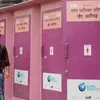How SATO is tackling the open defecation problem in rural India with low-cost toilets
SATO's eco-friendly and low-cost toilets are helping make India's Swacch Bharat Mission dream a reality. The 'green' toilets have been installed across many Indian states, and are a sustainable solution to India’s sanitation problem.
Since 1986, Marachi Subburaman, from Tiruchirapalli in Tamil Nadu, has been working to improve the lives of people through his non-profit organisation SCOPE (Society for Community Organisation and People’s Education). From women’s empowerment to providing a source of livelihood to others, Marachi’s aim was to improve people’s income to lead a comfortable life.
But, the 69-year-old soon realised that better income did not mean better life. Marachi found that families were spending a lot of their money on medical bills, the reason being lack of basic sanitation facilities. Following this, in 1996, his focus shifted towards sanitation.

Marachi and villagers at the opening of a new block of SATO toilets in a local primary school.
He developed a series of toilets called Ecosan, which have two pits; the waste can be channelled to farms for agricultural purposes. But the design was not user-friendly, and that’s when he came across SATO’s V-trap toilets in New Delhi.
SATO, part of LIXIL Corporation, a global leader in housing and building materials, is into manufacturing of eco-friendly and low-cost toilets. Their toilets use less water and don't cost more than Rs 700 per unit.
Today, nearly three million units of SATO toilets have been shipped to over 27 countries, improving sanitation facilities for 15 million people.
The moment of change and hope
According to Marachi, SATO’s toilets are designed specifically for India, and remove the hassle of switching between pits. In terms of functioning, they use two plastic pipes that are durable and easy to construct. After the first pit fills up, any long stick-like object can be used to switch the direction of the toilet. There’s no mess and no re-construction required.
He says, “Here, there’s no need to change the pit, and it’s really simple to move the door. Anybody can do it.”
The toilets need less than a litre of water to flush when compared to conventional toilets, which use almost 15 litres of water per flush.
The low-cost, affordable solution
Not just Marachi, many others like him across India have seen the same impact with the help of sustainable solutions.
Speaking to Social Story on the cost of the overall structure, Daigo Ishiyama, Director of Marketing and Technology, SATO, LIXIL, says,
“The basic cost of SATO toilets in India starts from Rs 250 and goes up to Rs 500 overall, depending upon add-ons like footrest and others. But even then, the overall cost doesn’t go above Rs 700. The products are easy to transport as well, and available in hardware stores across India.”

Daigo Ishiyama, of SATO, understands all the problems of local residents before designing an appropriate solution.
LIXIL rolled out its new ‘tailored’ SATO series of toilets in Madhya Pradesh and Uttar Pradesh, and has ventured into eight other Indian states since 2017. Its new customised solution is a twin-pit, pour-flush latrine that is easy to install, and can be fitted by local masons. It has been innovatively designed to address the challenges in India.
These toilets incorporate a simple yet innovative self-closing trap door, which effectively reduces transmission of disease and minimises odour. According to Daigo, the company has a patent for the V-Trap technology.
The twin-pit system also helps in minimising clogging and allows for water conservation, as it uses less than one litre of water per flush. SATO units are suitable for use with direct and offset pit installations, septic tanks, sewer connections, and water-based containment systems, and all of them are made from recycled plastic materials.

The V-Trap toilet being installed along with the twin pits in a village.
It can also be used at new construction sites or retrofitted as it can be dismantled easily into 18 curve panels, and later fitted into existing latrines to provide an easy, inexpensive upgrade. According to Daigo, it takes very less time for people to understand the construction of the toilet.
Daigo says, “In mountain terrains, where you can’t take cement, bricks, and other materials with ease, we can take these toilets and put them together instantly.”
Bringing better sanitation to the masses
In December 2018, Marachi’s SCOPE partnered with other NGOs and LIXIL to install SATO toilets at the Panchayat Union Primary School in the village of Pagalavadi in Tamil Nadu.
Despite having an existing toilet, school girls were often forced to wait outside for boys. The toilet was also unusable during rainy season due to the absence of a roof.
Soon, under the project, a block of SATO toilets for girls, complete with washing stations, hooks to hang dresses, and an incinerator for teachers’ sanitary napkins, was installed.
The work ahead
Open defecation has been a major problem in India for many years now. According to 2011 Census, only 32 percent of rural households in India had toilets.
To combat this problem, India launched the Swachh Bharat Mission (SBM) in 2014 to achieve a clean and open defecation-free India. As part of the initiative, the government pays families a subsidy to construct a toilet in their home, making it more accessible to people.
The team at SATO is already at work to expand its network in India by providing affordable and low-cost toilets. Apart from villages and schools, SATO is also installing toilets in colleges where they are much needed.
Through Toilet Board Corporation’s mentorship programme, LIXIL is currently guiding Lootel (India), a smart toilet cafe providing clean washroom services using a pay, use, and redeem concept. The concept translates into an innovative public washroom service where customers pay and use the toilet, and can later redeem the voucher at the Lootel Café.
LIXIL aids the startup with strategy, product design, and improving visibility to scale their business to bring sustainable solutions for India’s sanitation problem.
(Edited by Megha Reddy)










